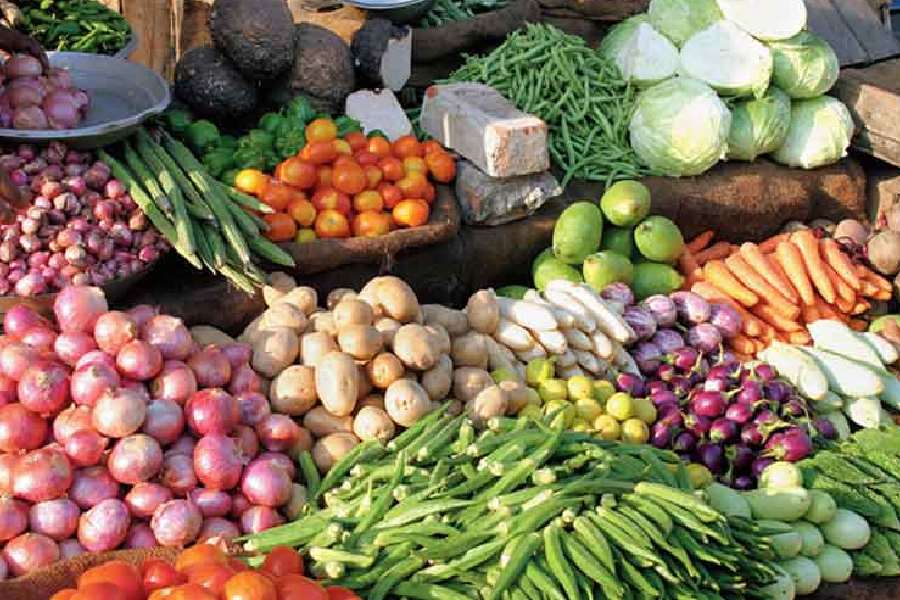Chief minister Mamata Banerjee said on Thursday the supply of vegetables like potatoes and onions to other states when Bengal’s produce can’t meet the state’s demand has sent vegetable prices on an upward spiral.
The state government, she said, will keep a regular watch on what is being supplied
from Bengal and the state’s daily requirements and instructed officials to keep her posted.
“I had said that till the new harvest arrived and our demand was met, potatoes should not leave the state. Now I see they have started exporting the crop,” Mamata said at a review meeting with three ministers and several senior officials, including the chief secretary and the director general of police.
“Please keep stock and you need to inform me from time to time,” Mamata said at the televised meeting. “I have no qualms if they export potatoes after meeting our state’s demand. Kintu Bangla-i daam baariey onyya jaiga theke munafa korbo, hobe na (I will not allow them to make profit from elsewhere and let the prices increase in Bengal).”
Bengal, along with Uttar Pradesh and Bihar, is a top potato-producing state with an annual production of around 13 million tonnes. But unseasonal rain that followed Cyclone Dana, which made landfall in Odisha on October 24, impacted the arrival of the new crop.
As a result, the prices of the old crop in cold storage have shot up, senior state government officials said.
On Thursday, the Jyoti variety of potato sold at ₹34-35 a kilo and Chandramukhi at ₹38-40 a kilo in retail markets in Calcutta.
Several retailers said the prices of both varieties were high for this time of the year, ahead of the arrival of the new harvest by mid-December.
The Bengal government has been struggling to bring the potato price below ₹30 a kilo since July but in vain.
“The price rise (of potatoes) in Bengal cannot be justified by the fact that the prices have gone up in other states, too. Bengal has a record in producing rice and potatoes,” Mamata said.
“It can’t be that I will allow the movement (of potatoes) to other states and let the
price go up in Bengal. I will ensure that other states receive the crop but only after the people of my state have had their fill.”
Mamata said the new potato crop will not reach the markets before the last
week of January or early February. Officials can’t allow its transportation to other
states without catering to the state’s demand for mere business gains, she
asserted.
“I need to know the exact status of the stock (of potatoes). Koto chhilo, koto beriyechhey aar ekhon koto achhey? (How much was there, how much was exported and what quantity is still left behind?) Why was I not informed? I had instructed storage till January,” Mamata said.
In July, potato traders went on an indefinite strike after the state government enforced a ban on the inter-state supply of the crop following the price rise.
The ban was lifted after the price stabilised a bit.
“I had started releasing (potatoes for supply to other states). But they exported as much as they could,” the chief minister said. Besides potatoes, Mamata also expressed unhappiness at the soaring onion price.
“The potato prices are rising. We started producing onions because a bulk of the crop had to be brought from Nashik. I don’t have enough onions and what we have will get transported outside? Why?” Mamata asked.
She said action needs to be taken if 50 per cent of the state’s onion stock is being exported.
Bengal requires around 10 lakh tonnes of onions annually. Around this time of year, when local produce is unavailable, the state depends on supplies from Nashik in Maharashtra and parts of Karnataka, Andhra Pradesh, Rajasthan and Bihar.
Several wholesalers said many in the trade are exporting onions to other states for better returns.
The Bangladesh government’s decision to waive import duty on onions till mid-January has compounded the problem as onion traders in India are now more keen on exporting the produce than feeding the domestic market, the traders said.
On Thursday, onions sold at ₹70-72 a kilo across most markets, a drop from ₹75 a kilo a fortnight back.
A section of middlemen in the agriculture sector are “commercially exploiting” the state for their benefit and “distributing a part of their gains to others”, the chief minister said.










